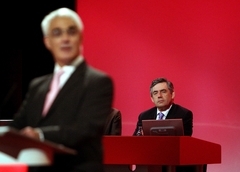 The most important line was George Osborne’s: “From this day on let there be no doubt who is winning the battle of ideas.” That’s right. Darling was chasing the Tories in this statement in a way Gordon Brown never did – or had to – when he was Chancellor, although there was a hint of the future in Mr Brown’s last, supposedly “tax-cutting” Budget earlier this year.
The most important line was George Osborne’s: “From this day on let there be no doubt who is winning the battle of ideas.” That’s right. Darling was chasing the Tories in this statement in a way Gordon Brown never did – or had to – when he was Chancellor, although there was a hint of the future in Mr Brown’s last, supposedly “tax-cutting” Budget earlier this year.
For a decade, the public bought into the line that the priority was to “invest” in health and education and that Conservative proposals to make even the most modest tax cuts would lead inexorably to the closure of schools and hospitals and the sending of poor wee children up chimneys. The high point of this was Mr Brown’s 1p increase in National Insurance in 2002 to pay for an NHS bonanza, a rise in direct taxation that had been favourably road-tested with focus groups and caused Labour no political difficulties at all. Indeed, there were Brownites at the time who said that this hike was only the beginning of a new age of incremental tax increases, linked to specific spending projects: the sweet socialist fruit of the party’s long quest for economic credibility. Well, it hasn’t turned out that way, as the same Brownites may have reflected last week as they surveyed the latest polling information showing how bafflingly well Mr Osborne’s inheritance tax proposals were playing in the marginals. These are Brechtian times for Labour: they really want to get a new electorate.
Some messages take a while to mature and one of William Hague’s best slogans when he was Conservative leader was: “You’ve paid the taxes, so where are the teachers (nurses/policemen etc)”. It was a great campaign, ten years before its time: the voters weren’t ready for the message yet. Having just elected a new Government in 1997, the electorate were still minded to give New Labour the benefit of the doubt. Trust in the Tories, meanwhile, was in the gutter. But the public is now starting to ask the question Tory MPs chanted today: “Where has all the money gone?” To a society of consumers, in which the principle caveat emptor has replaced old-fashioned deference, value for money really matters now. And the voter just don’t think, after ten years of Labour, that they’re getting value for money.
Hence Mr Darling’s woefully defensive performance. Hence Mr Osborne’s ebullience. All around us, the terms of trade are changing: exciting times.






Comments